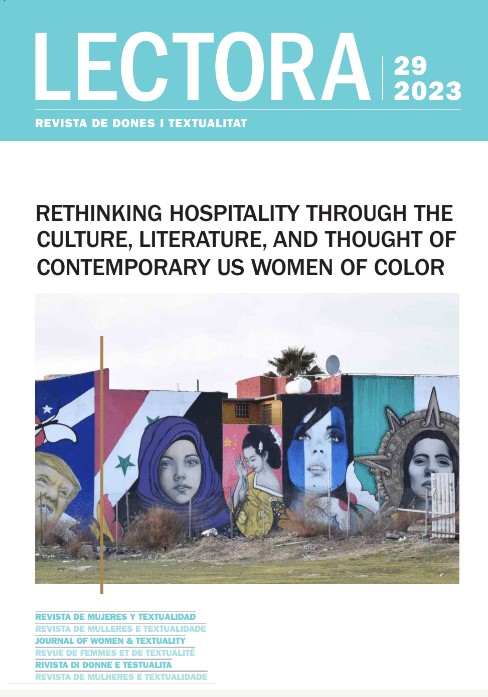Aportaciones de Kimberlé Crenshaw a la noción de interseccionalidad: mecanismos de invisibilización y reivindicación
DOI:
https://doi.org/10.1344/Lectora2023.29.8Keywords:
intersectionality, Black feminism, gender, race, structural intersectionality, political intersectionalityAbstract
The concept "intersectionality", coined by Kimberlé Crenshaw in 1989, has been widely used in a vast array of context and disciplines, transcending the field of Critical Race Theory. The main goal of the present research is to introduce some of the relevant theoretical tools for the generation of the notion "intersectionality". The chosen method is a review of Crenshaw’s first four texts. Since her work is widely read and highly influential, an analysis of her thought is carried out in order to grasp which references and which issues are addressed by the term "intersectionality".
References
Akoritene, Carla (2019), Interseccionalidade, São Paulo, Editorial Jandaira.
Collins, Patricia Hill y Sirma Bilge (2019), Interseccionalidad, Madrid, Ediciones Morata.
Crenshaw, Kimberlé (1988), "Race, Reform and Retrenchment: Transformation and Legitimation in Antidiscriminational Law", German Law Journal, 12: 247-84.
—(1989), "Demarginalizing the Intersection of Race and Sex: A Black Feminist Critique of Antidiscrimination Doctrine, Feminist Theory and Antiracist Politics", University of Chicago Legal Forum, 1: 139-67.
—(1991), "Mapping the Margins: Intersectionality, Identity Politics, and Violence against Women of Color", Stanford Law Review, 43 (6): 1241-99.
—(1992), "Whose Story Is It, Anyway? Feminist and Antiracist Appropriations of Anita Hill". Race-ing Justice, En-gendering Power. Essays on Anita Hill, Clarence Thomas and the Construction of Social Reality, Toni Morrison (ed.), Nueva York, Pantheon: 402-39.
—(2012), "Cartografiando los márgenes: interseccionalidad, políticas identitarias, y violencia contra las mujeres de color", Intersecciones: cuerpos y sexualidades en la encrucijada, Lucas Platero (ed.), Barcelona, Editorial Bellaterra: 87-122.
Crenshaw, Kimberlé, Neil Gotanda, Gary Peller y Thomas, Kendall (eds.) (1995), Critical Race Theory. The Key Writings that Formed the Movement, Nueva York, The New Press.
Curiel, Ochy (2015), "Construyendo metodologías feministas desde el feminismo decolonial", Otras formas de (re)conocer: reflexiones, herramientas y aplicaciones desde la investigación feminista, Irantzu Mendia Azkue y Bárbara Biglia (coord.), Logroño, Fundación DIALNET: 45-60.
Davis, Angela (2004), Mujeres, raza y clase, Madrid, Akal.
Espinosa Miñoso, Yuderkis (2020), "Interseccionalidad y feminismo descolonial. Volviendo sobre el tema", Pikara Magazine, 16/12/2020.
—(2022), De por qué es necesario un feminismo descolonial, Barcelona, Icaria.
Hancock, Ange-Marie (2007), "When Multiplication Doesn’t Equal Quick Addition: Examining Intersectionality as a Research Paradigm", Perspectives on Politics, 5 (1): 63-79.
Hankivsky, Olena (ed.) (2012), An Intersectionality-Based Policy Analysis Framework. Vancouver, BC, Institute for Intersectionality Research and Policy, Simon Fraser University.
hooks, bell (1982), Ain’t I a Woman. Black Women and Feminism, Londres, Pluto Press.
Jabardo, Mercedes (ed.) (2012), Feminismos negros. Una antología, Madrid, Traficantes de Sueños.
Mohdin, Aamna (2020), "Kimberlé Crenshaw: The Woman Who Revolutionised Feminism—and Landed at the Heart of the Culture Wars", The Guardian, 12/11/2020. < https://www.theguardian.com/society/2020/nov/12/kimberle-crenshaw-the-woman-who-revolutionised-feminism-and-landed-at-the-heart-of-the-culture-wars>
Nash, Jennifer (2019), Black Feminism Reimagined After Intersectionality, Durham, Duke UP.
Rodó-Zárate, Maria (2021), Interseccionalidad. Desigualdades, lugares y emociones, Manresa, Editorial Bellaterra.
Veiga, Anna (2020), "Uma virada epistémica (negra) conceitos e debates", Tempo e argumento, 12 (29): 2-32.
Werner, Gunda (ed.) (2019), "Reach Everyone on the Planet…": Kimberlé Crenshaw and Intersectionality, Berlín, Heinrich-Böll-Stiftung.
Downloads
Published
How to Cite
Issue
Section
License
Copyright (c) 2023 Mayte Cantero-Sánchez

This work is licensed under a Creative Commons Attribution-NonCommercial-NoDerivatives 4.0 International License.
The Author retains ownership of the copyright in this article and grants Lectora: revista de dones i textualitat the rights to print publication of the Article. The work will be available under a Creative Commons Attribution-Noncommercial-No Derivative Works license, by which the article must be credited to the Author and the Journal be credited as first place of publication.
The Author is free to enter in seperate, additional contractual agreements for the non-exclusive distribution of the work as published in this journal (such as institutional repositories or a book), as long as the original publication in Lectora is credited.
The Author is encouraged to post the work online (eg in institutional or thematic repositories, or in their website), as it can lead to productive exchanges as well as to a greater citation of the published work (see The Effect of Open Access).




